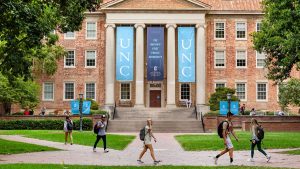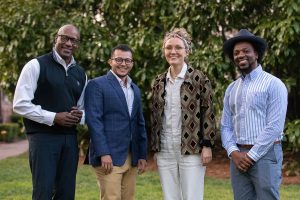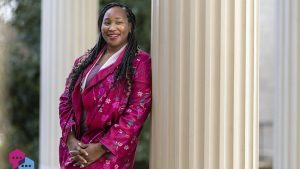Campus Briefs
Ensuring First-Generation Student Success
In the wake of the pandemic, retention and graduation gaps between first-generation, limited-income students and peers from higher-income backgrounds and families with college degrees may widen even further. UNC-Chapel Hill has taken a big step toward closing the gap and ensuring first-generation student success by joining the Kessler Scholars Collaborative. With generous financial support from Bloomberg Philanthropies and the Judy and Fred Wilpon Family Foundation, the University will receive a $1 million, five-year grant to establish the Kessler Scholars cohort-based model on campus.
Selected as one of 10 American Talent Initiative members to receive this grant, Carolina joins a diverse network of colleges and universities dedicated to supporting first-generation students through direct financial support and cohort-based services.
“At UNC-Chapel Hill, our commitment to affordability, accessibility and opportunity runs deep,” said Chancellor Kevin M. Guskiewicz. “The Kessler Scholars Collaborative expands our commitment to first-generation college students and aligns with our university’s mission and strategic plan — and our priorities as founding members of the American Talent Initiative. We are committed to sustaining the program and serving our students for years to come.”
Candid Conversations with Influential Innovators
Bernard Bell ’82, ’91 (MBA), the executive director of the Shuford Program in Entrepreneurship at UNC-Chapel Hill, emphasizes the importance of managing relationships through networking in his practicum in an entrepreneurship class. He often selects students to roleplay various engagement scenarios as they work to hone the skills they’ll need as company founders and leaders beyond Carolina.
So it’s no surprise that the genesis of the Shuford Innovators-in-Residence program was a conversation at a cocktail party hosted by Carolina alum Robin Richards Donohoe ’87 in San Francisco. Practicing what he teaches, Bell met and quickly found common ground with Carolina alum Mackenzie Thomas ’13, product and marketing inclusion lead for Google’s consumer apps team.
“We started talking about the need to improve inclusivity and diversity at UNC-Chapel Hill and specifically in the entrepreneurship minor,” recalled Bell, “and we quickly got to a place where we had an authentic conversation.”
Within a year, Thomas was knocking on Bell’s office door to discuss anything from shaping more inclusive syllabi for economics classes to the notion of “belonging” in the areas of academia and entrepreneurship.
“Those conversations allowed me to think more comprehensively on how to broaden the traditional concept of diversity and inclusivity,” shared Bell. “Mackenzie challenged me to think about how innovation can be leveraged to extend across every area of your life. She’s amazing.
Thomas now serves as a board member of the Shuford Innovators-in-Residence program, which has expanded from her initial residency in 2019 to a cohort of seven residents in 2022. The cohort of Carolina alums represents a variety of backgrounds and a wide range of disciplines, including health care, entertainment, Afrofuturism, venture capital, arts and e-commerce.
“This cohort is unique because, beyond their impressive accomplishments, we tried to look at who each person is from the inside out,” said Thomas. “What was their journey like; how do they challenge the status quo; and what core values do they lead with? Through candid conversations with these amazing folks, the program allows the students to see where they can go, always remembering where they’ve been.”
This spring, two members of the inaugural cohort, Soltan Bryce ’13 and Dedren Snead ’12, spent a full week on campus. They were featured guest speakers in several economics and public policy classes; they held open office hours and spoke to students at Global Career Night, and they participated in fireside chats emceed by Thomas.
Iruka: Early Childhood Equity is Justice
Iheoma U. Iruka, research professor in the public policy department in the College of Arts & Sciences and founding director of the Equity Research Action Coalition in the FPG Child Development Institute, focuses on ensuring excellence for young diverse learners, especially Black children and their families. The pivotal moment in her life that helped her choose this field of study occurred on her first day of ninth grade at Boston Latin School.
“I realized that a lot of my Black friends and classmates — especially the boys — who entered with me in seventh grade were longer there,” she recalls. “I was really sad and wondered why. They all ended up at an alternative high school. Many of us came from the same communities and had similar family structures and I wanted to understand what made it possible for me to stay at BLS and graduate and what made it hard for my Black male friends to not be there by ninth grade. My graduate studies focused on understanding the role of families in supporting children’s learning and achievement.”
She has applied a sense of ethics to her work that helped her navigate tricky situations while earning her academic credentials. “One of my mentors — who I really valued and looked up to — was treating one of my colleagues in a demeaning and dismissive way,” she remembers. “I was the youngest one in the room, and I was a junior scholar who still needed this mentor’s support and guidance. I ruminated on it all night debating what to do because I felt really uncomfortable with the situation.”
Though saying something to her mentor could potentially ruin her career, saying nothing would not allow her to live up to her moral and ethical values. “I decided to speak with my mentor about what they did and how it looked and felt to me. There was a risk I could be viewed as the ‘aggressive and angry Black woman,’ but I knew that speaking up was the right thing to do. While my mentor understood that what they did was not right, it taught me that I need to lead my life, including my career, in a way that is about justice, visible or invisible.”




